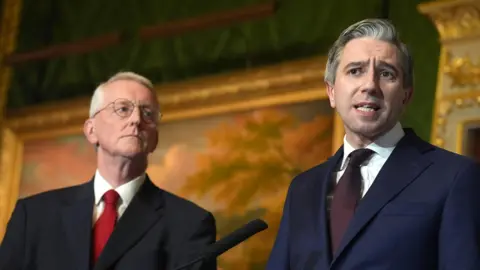In a pivotal moment in addressing the legacy issues from the Troubles, the UK and Irish governments are on the verge of potentially reaching an agreement that could reshape the current approach to investigating the past violence in Northern Ireland. This development comes as Simon Harris, the Tánaiste (Irish Deputy Prime Minister), expressed optimism about imminent progress in discussions regarding Troubles legacy matters, revealing that the two governments may have a clearer understanding within weeks.
During a recent press conference held at Hillsborough Castle, Harris noted that fundamental changes to the existing framework for investigating killings during the Troubles are necessary. He emphasized his determination to forge arrangements that are “vastly different” from previous mechanisms, reflecting a growing consensus that the past systems have failed to meet the needs of victims and their families adequately. Harris conveyed a heartfelt message, stressing that countless families have endured prolonged waits for truth and justice, which underlines the urgency of reforming the legacy structures.
Accompanying Harris at the meeting was UK Secretary of State Hilary Benn, who echoed concerns regarding the current investigatory structures. Benn indicated that he is committed to implementing significant reforms to the existing system, particularly the Independent Commission for Reconciliation and Information Recovery (ICRIR), which has faced scrutiny from various advocacy groups. Many victims’ organizations have voiced their criticism, arguing that the ICRIR lacks the necessary independence to carry out thorough investigations into the conflict’s killings.
The meeting in question was part of the British-Irish Intergovernmental Conference (BIIGC), an established dialogue mechanism under the Good Friday Agreement that is designed to enhance cooperation between the UK and Ireland. This particular assembly was significant as it marked the first BIIGC convened in Northern Ireland since 2006, a long gap that reflects changing political dynamics and challenges faced in cross-border cooperation. Throughout the conference, ministers explored not only legacy issues but also wider discussions about political stability and security in the region, further indicating the interconnectedness of these topics.
Harris revealed his aspiration to establish a joint governmental stance on the legacy mechanisms, highlighting the positive direction of ongoing talks. He stated, “I really hope it is possible to have a joint position,” emphasizing the collaborative spirit both governments are striving to achieve. The urgency in reaching an agreement is underscored by the historical context, as families of victims have been waiting for years for meaningful action and accountability related to the Troubles.
Reaching an accord on these issues could lead to a reevaluation of the Irish government’s legal opposition to the UK on legacy matters, illustrating the intricate relationship between legal action and cooperative dialogue. Moreover, Harris’s commitment to exploring new mechanisms reflects a broader commitment to ensuring that the voices of victims and their families are prioritized in the process.
Another pivotal focus of the recent discussions was the Omagh bombing inquiry, with Justice Minister Jim O’Callaghan reassuring families affected by the tragedy that the Irish government is “fully committed” to cooperating with the warranted investigation. Recent criticisms concerning a lack of consultation regarding the Memorandum of Understanding (MoU) related to this inquiry have added layers of tension. O’Callaghan has urged families to remain hopeful, assuring them that the government would provide necessary documentation to facilitate a transparent inquiry, promoting trust among those seeking closure.
Ultimately, the BIIGC continues to symbolize the interdependence of the UK and Irish governments, rooted in a shared historical narrative that requires ongoing cooperation for reconciliation. The commitment to review legacy mechanisms alongside the willingness to engage on broader security and stability aspects portrays a comprehensive approach to addressing the complex legacies of the past. As both governments further negotiate these challenging matters, the expectation is growing that they will find a path forward that honors the memories of the past while fostering a more secure and collaborative future.



